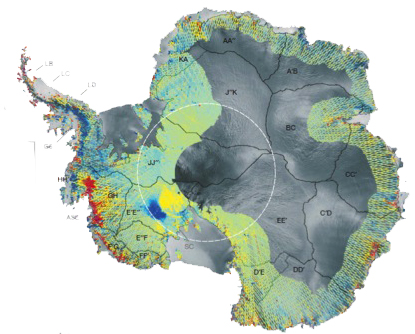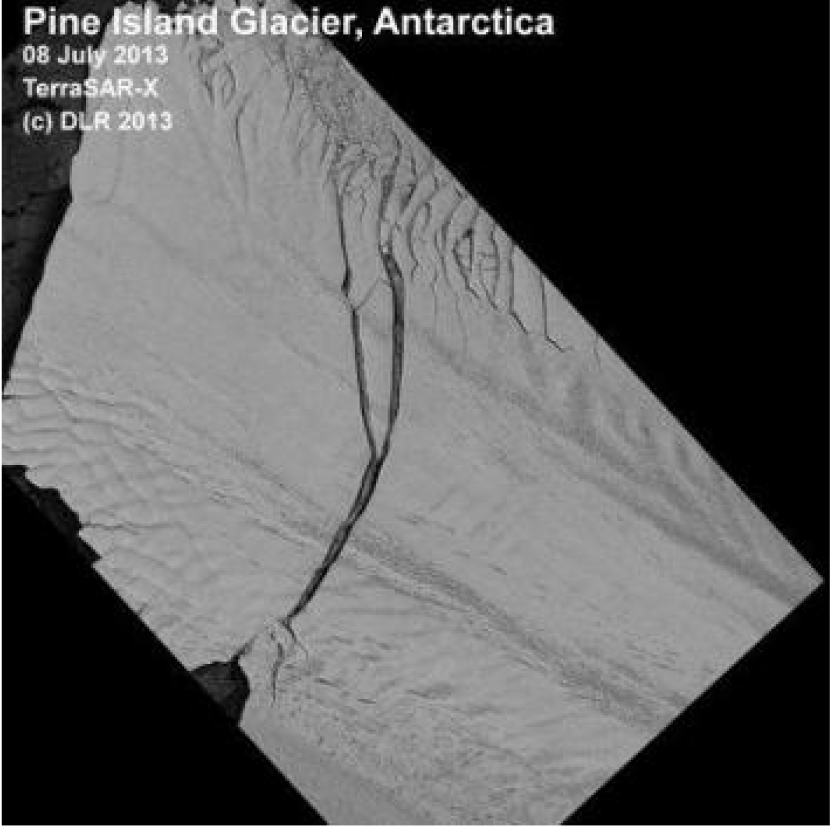Big Chunk of Antarctica Breaks Off – The signal of catastrophic sea level rise?
 An iceberg larger than Chicago broke off from West Antarctica last week. By itself that might be news. This one deserves special attention because it broke off of Pine Bay Glacier.
An iceberg larger than Chicago broke off from West Antarctica last week. By itself that might be news. This one deserves special attention because it broke off of Pine Bay Glacier.
Readers of my book, “High Tide On Main Street: Rising Sea Level and the Coming Coastal Crisis” may recognize that location. On page 59 I name that precise glacier as the weak spot of Antarctica.
On the map at the left this is in the area in red at the eight o’clock position.
In 1978 a legendary expert, the late Dr. John Mercer, said this was the place that could herald the big melt that would lead to catastrophic sea level rise (SLR). If Pine Bay and its sister glacier “Thwaites” slid into the ocean, Mercer calculated that global sea level could rise about six feet over the course of a decade or so.
As I describe in the book, he put a rough timeframe of fifty years on that scenario. We are now in the middle of the fourth decade. It has been showing signs of softening and melting in recent years. Recent calculations with more sophisticated satellite data on the ice mass indicate that Mercer’s estimates were on the low side.
We should clarify that the iceberg breaking off from the floating ice shelf does not raise sea level at that moment. Floating sea ice does not change the water level as it melts, similar to ice cubes melting in a glass. This particular piece of ice affected sea level years ago, when it slowly moved off the land and onto the water. The bigger problem is that the ice shelf acts like a stopper in a bottle, holding back the huge glacier that is above sea level, going back hundreds of miles onto the continent. As the ice shelf fractures into icebergs and drift off, removing the “stopper”, the glacier will flow from land to ocean. That is the ice that will substantially raise sea level.
 Shown here is the huge chunk of glacier breaking off into an iceberg, captured on a German satellite photos on July 8 and reported by UPI (United Press International) on July 12. While we do not want to jump to conclusions and scare people, I think this is an event worth noting.
Shown here is the huge chunk of glacier breaking off into an iceberg, captured on a German satellite photos on July 8 and reported by UPI (United Press International) on July 12. While we do not want to jump to conclusions and scare people, I think this is an event worth noting.
If it is the start of the collapse of the West Antarctic Ice Sheet (WAIS), what some refer to as “the big melt” there will be increasing similar events. I will be monitoring these and will send out announcements. (If you are not already subscribed to my blog, you can sign up on the home page.)
I should point out something that most people do not realize. None of the projections for sea level rise that you read about, even from the most eminent scientific organizations, include the meltdown of the Pine Bay glaciers and similar so called “catastrophic events.”
The current consensus from the scientific community is that we could have between 2 – 6 feet (70 – 200 cm) of sea level rise this century. Surprisingly they do not include events like the loss of the Pine Bay glaciers, essentially for this reason: The models are based on what they predict with certainty during this century. Typically they use a 90% confidence factor. So, if we are not 90% certain that this glacier will disgorge into the ocean this century — if it might not happen until next century — it is not part of the projection. That 90% is a very high “bar” to meet and is set to avoid speculation about various possibilities.
What is already clear is that sea level is rising faster than the projections. Just in the last twenty years, actual sea level rise is at the very upper limit of what the scientific community projected in 1990 and later revised in 2002. It is worth keeping an eye on West Antarctica. An extra six feet of sea level rise would be catastrophic. Even if that occurred slowly over ten or fifteen years we have a real challenge to adapt.
Sea level is rising. The sooner we begin adapting to the new reality the better. It is not a matter of “if”, but rather when. The oceans are substantially warmer. The ice will continue to melt. Sea level will continue to rise. The shoreline will move inland.
If you are reading this, you are probably one of the small but growing group that favors intelligent discussion, good information, and rational policies. Please help share this information, but sharing this blog or by other creative means. Perhaps share those here so the rest of us might consider them too.
